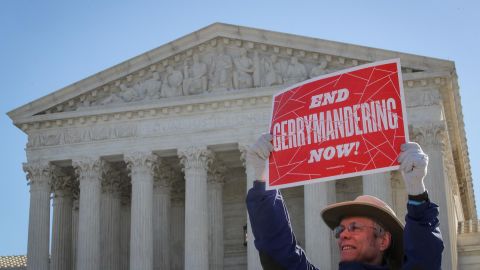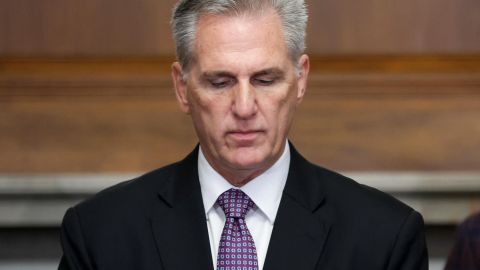NPR’s Tamara Keith and Andrew Desiderio of Punchbowl News join Geoff Bennett to discuss the latest political news, including what’s next for Speaker McCarthy after making a deal with Democrats to avoid a government shutdown, the appointment of Laphonza Butler to fill the Senate seat once held by Dianne Feinstein and President Biden’s response to concerns about his age.
GEOFF BENNETT: And let's dig deeper into the developments on Capitol Hill now with our Politics Monday team.
That's Tamara Keith of NPR and Andrew Desiderio of Punchbowl News.
Amy Walter is away this evening.
So, another Monday, another torrent of news, friends.
It's great to have you both here.
So, Andrew, as we just heard Lisa outline in her reporting, Congressman Matt Gaetz, who is Kevin McCarthy's most outspoken critic, is threatening to use this procedural tool called a motion to vacate to strip Kevin McCarthy of his speakership, a speakership that took 15 ballots on the floor for him to get.
Can he successfully defend against this effort?
ANDREW DESIDERIO, Punchbowl News: He can.
But, ironically, his fate rests with House Democrats.
And House Democrats know that, and they may try to exact some concessions from him.
At this point, we're not quite sure what that would look like, maybe some sort of -- not quite a power-sharing agreement, but the ability to do certain things that the minority usually doesn't get to do.
So that's something that Kevin McCarthy is going to have to weigh this week.
But Matt Gaetz has said that he's going to continue doing this to the -- every time that McCarthy needs Democrats to pass something, right?
Well, he's going to need Democrats to pass Ukraine funding.
He's going to need Democrats to pass the defense bill.
He's going to need Democrats to pass the farm bill, the ag bill, all that stuff later this year.
So the question is, is the House going to be paralyzed by this sort of chaos for months and months to come, when they have actual must-pass work to do?
GEOFF BENNETT: And, Tam, what's the decision matrix for -- decision matrix for Democrats as they determine whether to bail out Kevin McCarthy?
Andrew mentioned concessions.
I mean, could they say, you end this impeachment inquiry, we will give you the votes?
We get a clean vote on Ukraine funding, we will give you the votes that you can keep your job?
TAMARA KEITH, National Public Radio: They could.
But I'm not sure that that's a deal that Kevin McCarthy would necessarily make.
He is a very weak speaker because of all of the concessions he already made.
He seems to be sort of at a point where he's like, all right, bring it.
And I don't know how much more he's going to be willing to give up.
So, for Democrats, there's also just this calculation of the devil and the devil you don't know.
They know Kevin McCarthy.
They know that, in the end, when pressed, he did actually choose to govern over choosing to shut the government down, choosing to take the far right position.
So that is something that weighs somewhat in his favor with Democrats.
It's not like they like him, to be clear.
And from the White House side of things, oh, my gosh, they do not want to touch this with a 10-foot pole.
GEOFF BENNETT: Why not?
(LAUGHTER) TAMARA KEITH: I mean, this is like one of those things that they are happy to be hands off about.
(LAUGHTER) GEOFF BENNETT: Well, there is this question, Andrew, of who is waiting in the wings.
Congressman Gaetz spoke to reporters in the steps of the Capitol today, and he mentioned the House majority leader, Steve Scalise, who, one imagines, has other considerations, given that he has health issues.
Is there another Republican who people are talking about who could lead this super-fractured conference?
ANDREW DESIDERIO: The short answer is no.
And that's part of the problem here is, there really is no alternative.
You press Gaetz on who he wants to see in that position, it's someone who says publicly that he wants McCarthy to remain in that position.
And so there is no challenger.
There is no one sort of taking up a mantle and saying, I want to be the anti-McCarthy candidate here.
And that's why, when you see Democrats and the White House, you see their posture on this, I think a lot of them think that, if it's not Kevin McCarthy, it could be someone worse, in their eyes.
So, as Tam said, the devil you know versus the devil you don't know.
They would be much more comfortable if McCarthy remained in the speakership.
GEOFF BENNETT: Well, let's keep our focus trained on the Hill and talk about another story, with California Governor Gavin Newsom choosing Laphonza Butler.
She's the president of EMILY's List.
And she is named to fill the seat of the late Democratic Senator Dianne Feinstein, who passed recently.
She will be the third Black woman to ever serve in the Senate, as well as the first openly LGBTQ person to represent California.
And, in a statement, she says this: "For women and girls, for workers and unions, for struggling parents waiting for our leaders to bring opportunity back to their homes, for all of California, I'm ready to serve."
Andrew, there's nothing in this statement that suggests she's looking at this as being sort of a caretaker.
ANDREW DESIDERIO: Yes, sounds like she might run for reelection or stand for election to a full term in 2024.
That will throw a major wrench in the ongoing primary in California right now.
You have got Adam Schiff, Barbara Lee, and Katie Porter all running for that seat.
They're all current House Democrats.
Schiff is viewed as sort of the front-runner here.
The Congressional Black Caucus was pushing for Barbara Lee to be named to -- as the replacement to Senator Feinstein.
Obviously, whoever's the incumbent has the advantage of incumbency, which means you have the Democratic Party's campaign apparatus behind you in everything you do.
So, if senator-designate Butler decides to run for reelection, she is automatically the front-runner, and she will most likely have the support of the Senate Democratic campaign arm.
And Schiff, Porter, and Lee are left wondering what their political future is.
GEOFF BENNETT: We have a couple of minutes left.
I want to talk about 2024, because President Biden gave an interview to journalist John Harwood that published yesterday where he was asked about the Democratic hand-wringing about President Biden's age.
Here's how he responded.
JOE BIDEN, President of the United States: I'm not the only Democrat that can protect it.
I just happen to be the Democrat who I think is best positioned to see to it that the guy I always worry about taking on democracy is not president.
GEOFF BENNETT: And so the specific question was, why are you the only Democrat who can protect democracy next year?
That was the president's response.
We can expect to hear more from this, more on this sort of theme from President Biden?
TAMARA KEITH: Oh, in terms of talking about defending democracy against Donald Trump, that is going to be one of the pillars of President Biden's campaign.
The speech that he gave last week in Arizona is just the beginning of what is going to be a lot of that messaging.
In terms of Biden's point there that he is not the only Democrat, but he's the best Democrat, back to the power of incumbency.
He's the incumbent president.
He has all of the power of incumbency.
And, additionally, he has consolidated the Democratic establishment behind him, in part with the idea that, if there were to be a robust primary challenge -- and there isn't one -- but if there were to be, that would put the Democratic Party at a disadvantage heading into 2024 general election.
And you just look back to history and the one-term presidents who had robust primary challenges.
And that is why Joe Biden is the establishment choice.
GEOFF BENNETT: What's the word on the Hill about that?
ANDREW DESIDERIO: Well, look, there isn't a serious challenge to President Biden within the Democratic Party.
But, over the weekend, you did see Congressman Dean Phillips, a Democrat from Minnesota, step down from his elected leadership post in the House Democratic Caucus because he has been openly skeptical about the idea of President Biden being their -- the party standard-bearer in 2024.
He hasn't suggested that he would be the one to challenge him, but suggested that maybe Democrats would be better off with someone else.
To Tam's point, I think if you open up this up to a primary process, and then someone emerges, whether it's Biden or someone else, bruised in the end, that that hurts the party as they try to take on presumably Donald Trump.
GEOFF BENNETT: All about the power of incumbency.
(LAUGHTER) ANDREW DESIDERIO: Yes.
GEOFF BENNETT: Tamara Keith and Andrew Desiderio, thanks so much.


